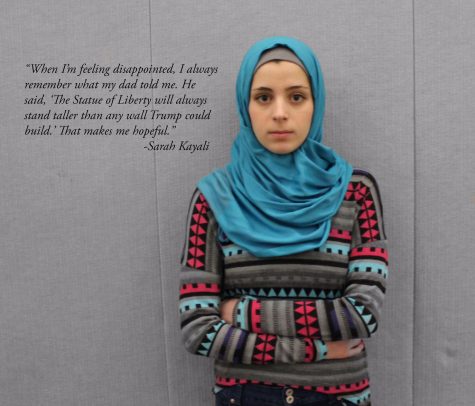Knowing the facts
Donald Trump has been President for a mere two weeks, but the amount of executive orders put in place eludes otherwise. From defunding Planned Parenthood to repealing ObamaCare, Trump took office with change on his mind. On Jan. 27, 2017, President Trump signed an executive order suspending refugee resettlement and entry into the U.S. of people from several countries.
The suspension of refugee resettlement into the U.S has been placed for four months and refugee resettlement from Syria has been placed indefinitely. Other countries affected are Iran, Iraq, Libya, Somalia, Sudan and Yemen. The order allows exceptions for refugees in minority religious groups and for those already in transit for whom a denial would cause undue hardship, or in line with pre-existing international agreements. When the refugee program is reinstated, refugees in minority religious groups will be prioritized for acceptance.
The ban also affects people newly arriving on immigrant visas, which are issued based on employment or family status. People who are issued immigrant visas become legal permanent residents upon arrival in the United States and are issued a green card soon after.
Worldwide perspective
The response from the rest of the world to Donald Trump’s immigration order has been nothing less than a global backlash. Governments from London and Berlin to Jakarta and Tehran spoke out against Trump’s order which he claims will protect Americans from terrorism. Maddie Henricksen, former Pleasant Valley student, is studying abroad in Spain this semester through Iowa State and said, “It’s really hard watching all the news here. The caption on the TV literally translated to “Trump against all” and I didn’t know what to think because the news is so skewed and everyone dislikes Trump here.”
Aside from Spain, Trump’s bad reputation has also spread to Canada. On Sunday, the Canadian Embassy in Washington confirmed that it had been given the all-clear: the dual nationality restrictions in the new order would not apply to people with Canadian citizenship. Although their relationship with the United States may be safe for now, Canadians and the Embassy are still very confused about their future relations with the US.
A student’s experience
Sarah Kayali is a Junior at Pleasant Valley High School. She is Syrian herself and has family that continues to reside in Syria. Kayali recounts her feelings of the executive order and how it affects her family. “I am very disappointed in the ban because I feel like America has been going forward for a very long time and I feel like this decision has made it go backwards a million steps. We were able to get my grandma a green card about three weeks ago, so she was able to enter the U nited States and she is living at our house right now. We’ve been trying to get my grandma a green card for three or four years now and when we finally got her one, this new law was put in place, so she can’t use it anymore. She was planning on going back to Syria because my uncle is over there and she wanted to visit him, but she isn’t able to now, because she won’t be able to re-enter the United States after the visit. I feel like this law should be abolished because it’s not fair for the people of the world, Syrians especially.”
nited States and she is living at our house right now. We’ve been trying to get my grandma a green card for three or four years now and when we finally got her one, this new law was put in place, so she can’t use it anymore. She was planning on going back to Syria because my uncle is over there and she wanted to visit him, but she isn’t able to now, because she won’t be able to re-enter the United States after the visit. I feel like this law should be abolished because it’s not fair for the people of the world, Syrians especially.”








